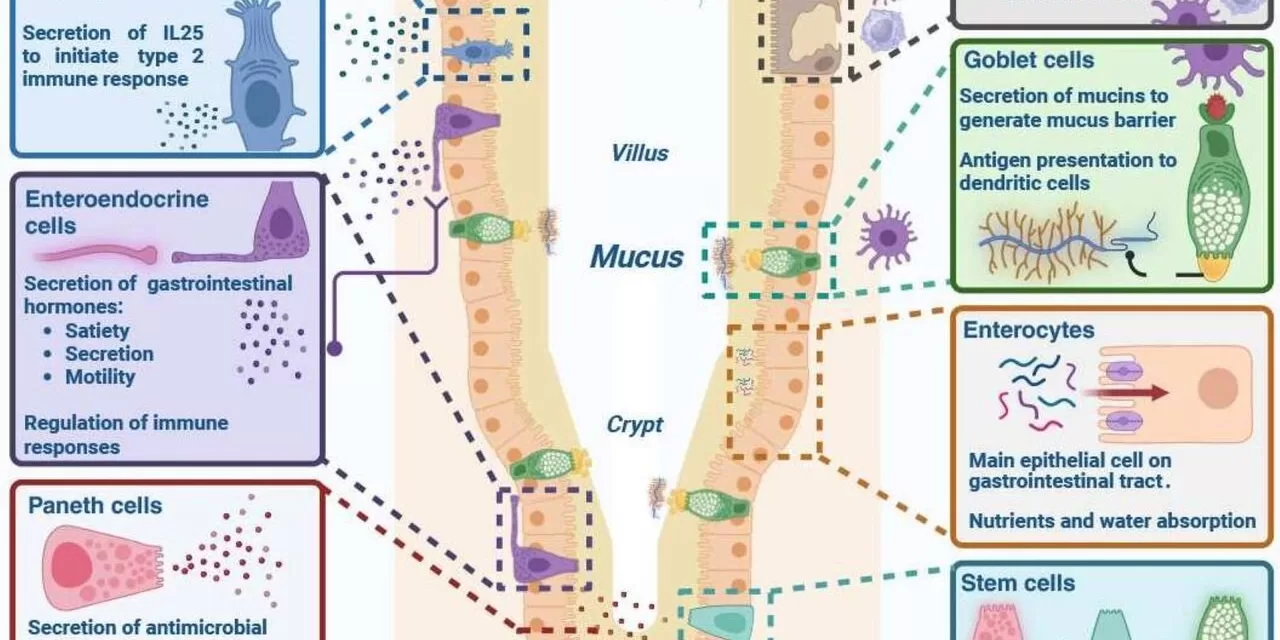The intestinal epithelium is a highly dynamic barrier that plays a crucial role in digestion, nutrient absorption, immune regulation, and communication between the gut microbiota and the nervous system. Maintaining homeostasis in the intestine requires intestinal epithelial cells (IECs) to efficiently manage protein production and secretion. This process is tightly regulated by the unfolded protein response (UPR), a cellular stress response mechanism that ensures protein folding and proteostasis within the endoplasmic reticulum (ER).
A groundbreaking study published in eGastroenterology has highlighted the significant role of UPR dysregulation in intestinal diseases, including inflammatory bowel disease (IBD) and colorectal cancer. The research suggests that targeting the UPR pathway could open new avenues for therapeutic interventions in these conditions.
The Role of UPR in Intestinal Health
The ER serves as the primary site for protein folding and processing. Under high secretory demand or environmental stress, IECs activate the UPR to restore protein homeostasis. The UPR is regulated by three critical stress sensors: inositol-requiring enzyme 1 (IRE1), protein kinase RNA-like ER kinase (PERK), and activating transcription factor-6 (ATF6). These sensors work together to mitigate ER stress, promote proper protein folding, and modulate immune responses.
However, when ER stress becomes chronic or is exacerbated by genetic mutations, it can lead to severe intestinal dysfunction. The study indicates that patients with Crohn’s disease and ulcerative colitis exhibit heightened ER stress markers in their IECs. Dysfunction in Paneth and goblet cells—responsible for antimicrobial defense and mucus production—further contributes to gut dysbiosis and inflammation.
XBP1: A Key Player in Gut Proteostasis
The research highlights the essential role of X-box binding protein 1 (XBP1), a transcription factor activated by the IRE1 pathway. Experimental models demonstrated that XBP1 deletion in the gut epithelium leads to spontaneous inflammation, increased bacterial susceptibility, and defective antimicrobial peptide production. Additionally, genetic variations in the XBP1 gene have been linked to an increased risk of IBD, reinforcing its importance in gut health.
UPR and Colorectal Cancer
Beyond IBD, the study also explores the involvement of UPR in colorectal cancer. While ER stress can initiate apoptosis, it may also aid tumor progression by helping cancer cells adapt to hypoxic and nutrient-deprived conditions. Notably, reduced XBP1 activity correlates with poor survival rates in colorectal cancer patients, suggesting that modulating the UPR could influence disease outcomes.
Potential Therapeutic Approaches
Given the central role of ER stress in intestinal disorders, researchers are investigating pharmacological methods to regulate the UPR. Chemical chaperones like 4-phenylbutyrate (4-PBA) and tauroursodeoxycholic acid (TUDCA) have shown promise in alleviating ER stress and reducing inflammation in experimental colitis models. Additionally, recombinant BiP, an ER-resident chaperone, has demonstrated potential in enhancing gut barrier integrity and reducing immune cell infiltration.
The study also explores innovative therapeutic strategies such as ER hormesis—a technique that leverages mild stress to strengthen cellular resilience. Experimental treatments like CTB-KDEL, a modified cholera toxin B subunit that induces mild ER stress, have shown promise in improving intestinal barrier function and wound healing.
Dietary and Gut-Brain Axis Considerations
In addition to pharmaceutical interventions, dietary components influencing ER proteostasis are gaining attention. Natural compounds such as flavonoids and probiotics with proteostasis-enhancing properties could serve as complementary therapies for intestinal disorders.
Moreover, the study investigates the interplay between the UPR and the gut-brain axis. Emerging evidence suggests that neuronal UPR activation may impact intestinal proteostasis through systemic signaling, paving the way for new insights into brain-gut interactions in disease contexts.
Conclusion
This research underscores the critical role of the UPR in maintaining intestinal homeostasis and its potential as a therapeutic target for IBD, colorectal cancer, and other gut-related disorders. As scientists continue to explore ways to modulate ER proteostasis, the future may see groundbreaking advancements in gastrointestinal disease treatments.
Disclaimer:
This article is intended for informational purposes only. It does not constitute medical advice, diagnosis, or treatment. Individuals should consult healthcare professionals before considering any new treatment approaches.
More information: Claudio Hetz et al, Essential roles of the unfolded protein response in intestinal physiology, eGastroenterology (2024). DOI: 10.1136/egastro-2024-100129.












